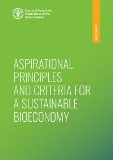Forests and forest products provide important contributions for the transition towards a sustainable bioeconomy and to build carbon-neutral societies

Brussels - Bioeconomy is one of the 20 Programme Priority Areas of FAO in the Strategic Framework 2022-2031. FAO's aim is that the bioeconomy for sustainable food and agriculture will balance economic value and social welfare with environmental sustainability.
Mr Sven Walter, Senior Forestry Officer, FAO, participated in the conference held in Brussels dedicated to bioeconomy and sustainable use of natural resources.
The EU Bioeconomy strategy progress report published in June 2022 acknowledged the key role of bioeconomy to achieve the key EU objectives, mainly in tackling climate change and substituting fossil-based materials and fuels, while contributing to biodiversity and viable rural areas.
Mr Walter, in his remarks, noted that when we look at the current situation it is important to consider environmental sustainability:
- Currently, 75 percent of the total material demand is met with non-renewables resources – only 25 percent from renewable materials.
- Global population is expected to increase from 7.7 billion in 2019 to 9.7 billion in 2050.
- Global consumption of natural resources is expected to more than double from 92 billion tonnes in 2017 to 190 billion tonnes in 2060.
Noting the important moment to move towards a sustainable bioeconomy, coupled by population growth, we can expect an increasing demand in natural products – including forest products. But we need to decouple economic growth and population growth from increased use of fossil-based products.
“To ensure the sustainable production and consumption – as called upon by SDG 12 - Responsible Consumption and Production” is primordial!” stated Mr Walter.
- Meeting future demand for sustainable wood may be achieved by a combination of increased sustainable production in naturally regenerated temperate and boreal forests and in planted forests increasingly in the global South.
- We need to assure the origin of bioproducts from legal and sustainable sources. Europe as an importing market has started to go beyond voluntary certification measures by putting in place APPROPRIATE legal frameworks (Ref. EUDR – European Deforestation regulation) to ensure that imported commodities are sourced legally and sustainably and do not result in deforestation. These measures need to be accompanied by capacity building measures.
- We need to measure, monitor and respond to future demand and know the available supply. We can’t improve what we don’t measure and don’t know.
FAO is ready to lead and coordinate global action on the transition towards a sustainable and circular bioeconomy that provides innovations for food security, climate action, as well as circular and cascading resource use, while reducing dependence on fossil-based inputs and synthetic chemicals, reducing trade-offs, and supporting livelihoods and resilience in agrifood systems.

